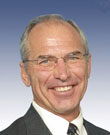|

|
The
views expressed
on this page are soley those of the author and do not
necessarily
represent the views of County News Online
|
 |
Townhall Finance
Secular
Stagnation Is a Cover-Up
Larry Kudlow
Co-written by Stephen Moore
Aug 17, 2014
John F. Kennedy campaigned for president in 1960 by belittling Dwight
Eisenhower's three recessions and declaring, "We can do bettah." He was
right. In the 1960s, after the Kennedy tax cuts were implemented,
prosperity returned, the economy grew by almost 4 percent annually,
unemployment sank to record lows and a gold-linked dollar held down
inflation.
But today many leading economists are throwing up their arms in
frustration and assuring us that 2 percent growth is really the best we
can do.
Barack Obama's former chief economist Larry Summers began this chant of
"secular stagnation." It's a pessimistic message, and it's now being
echoed by Federal Reserve vice chair, Stanley Fischer. He agrees with
Summers that slow growth in "labor supply, capital investment, and
productivity" is the new normal that's "holding down growth." Summers
also believes that negative real interest rates aren't negative enough.
If Fisher and Fed chair Janet Yellen agree, central bank policy rates
will never normalize in our lifetime.
Unfortunately, Americans seem to be buying into this dreary assessment.
A new Wall Street Journal poll finds that three out of four Americans
think the next generation will be worse off than this generation. So
long, American Dream.
But secular stagnation is all wrong. It's a cover up for mistaken
economic policies that began in the Bush years and intensified during
the Obama administration.
It would be hard to conceive of a worse set of policy prescriptions
than the ones Larry Summers and his Keynesian collaborators have
conjured up. We've had bailouts, massive spending-stimulus plans, tax
increases on "the rich," Obamacare, rudderless monetary policy that has
collapsed the dollar, the Dodd-Frank bill, anti-carbon policies, a vast
expansion of the welfare state, and on and on...
Read the rest of the article at Townhall Finance
|
|
|
|

